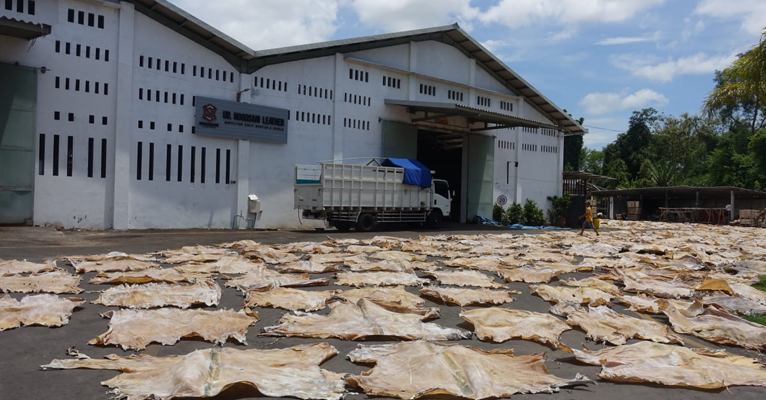Saat ini perdagangan internasional sedang menikmati kebijakan tarif rendah sebagai dampak dari sistem perdagangan bebas.…
BPIPI and WBBM


The themes of innovation and governance today cannot be separated and will be interrelated. Likewise, public services cannot be separated from the quality of services and policies. Community-oriented policies are expected to improve services to meet their needs. The community is also expected to benefit from the policy as a legal umbrella to regulate and control the implementation of public services. Robi C.K (2016), argues that public service is the provision of services (serving) the needs of people or communities who have an interest in the organization in accordance with the tasks, functions and procedures that have been set. Thus, public services are carried out in accordance with existing policies and regulations.
The Footwear Industry Development Center (BPIPI), as a public service work unit under the Directorate General of Small, Medium, and Miscellaneous Industries of the Ministry of Industry, which currently holds the title of WBK (Corruption-Free Area) sees the need to update the blueprint for the construction of integrity zones as an effort to maintain WBK (Regional Areas). Free from Corruption) and prepare themselves for WBBM (Clean Area Free to Serve).
The year 2019 is an essential momentum for BPIPI as a work unit to show better performance in the Ministry of Industry and in serving the community. Providing the best BPIPI services in 2019 is a shared commitment to realizing the integrity of the State Civil Apparatus who are sincere and sincere in their service, implementing a comprehensive government internal control system, and implementing a productive and efficient work culture.
Realizing the Integrity Zone is a pride as well as a predicate given to work units within the Ministry of Industry as an effort to implement the Shoes Industry Development Center (BPIPI) as a Corruption Free Area (WBM) and a Clean and Serving Bureaucratic Area (WBBM).
To support the development of the integrity zone, BPIPI carries out a gradual and planned digital transformation process by developing Internet of Things (IoT)-based services in every service function of the organization. This transformation process answers the challenges ahead for the policy of the Ministry of Industry, which has prepared the initiation of "Making Indonesia 4.0" as the implementation of Indonesia's roadmap towards the industrial revolution 4.0.
Currently, BPIPI has re-launched the Bureaucratic Reform program to realize the expectations of the community and stakeholders to become a more trusted BPIPI, which provides excellent service, zero complain and makes BPIPI superior and professional. With the motto SALAM SEPATU Semangat – Cepat – Jitu BPIPI aspires to be a public service organization with continuous innovation, simple administration and bureaucracy, fast, precise, accountable, informative, accurate, reliable and accessible operations and services. This is solely to realize the acceleration of the national bureaucratic reform program to realizegood & clean governance).
From 2018 to 2020, BPIPI has declared an integrity zone as a program that is inherent in every implementation of organizational activities. BPIPI continues to make improvements by implementing the Bureaucratic Reform program in the 2020-2025 period with several areas of change, including the fields of culture, institutions, management, Apparatus HR, Supervision, Accountability, Public Service and and Apparatus Mind-Set in realizing the BPIPI apparatus that is clean and with integrity in providing services and increase capacity and performance accountability.
The sustainability of the implementation of Bureaucratic Reform BPIPI has a vital role in realizing BPIPI that is professional and with integrity according to community expectations and the results that have been achieved from the previous implementation of Bureaucratic Reform are the basis for the implementation and evaluation of the 2020-2025 Bureaucratic Reform program as outlined in the Blueprint (Road Map)Road Map) Bureaucratic Reform. Therefore, implementing Bureaucratic Reform at BPIPI reinforces the previous performance of Bureaucratic Reform.
Saat ini tuntutan inovasi layanan publik terus bergulir di lingkungan organisasi pemerintahan. Namun kenyataannya hubungan antara organisasi dan inovasi adalah hubungan yang komplek, dinamis dan multilevel (Lam, 2006). Menurut pendapat Demircioglu (2016), inovasi yang baik adalah inovasi yang mampu menyelesaikan masalah. Advokasi inovasi layanan publik bukan hal yang baru. Sejak lahirnya undang-undang pelayanan publik tahun 2009, banyak implementasi ilmu pengetahuan yang melibatkan mulitidisiplin selama 10 tahun terakhir berhasil mengidentifikasi beberapa isu penting, mengapa beberapa inisiatif inovasi berhasil, sedangkan inovasi yang lainnya belum berhasil. Banyak peneliti dari multidisiplin ilmu termasuk sosiologi, psikologi, sosiopsikologi, ekonomi, antropologi, ilmu politik, IT, llmu komunikasi, studi ilmu kesehatan serta organisasi dan manajemen mempunyai kontribusi pada kajian inovasi (Greenhalgh, 2004).
Mengapa inovasi begitu penting dalam organisasi pelayanan publik?, karena lingkungan organisasi yang terus berubah, maka organisasi membutuhkan inovasi untuk bertahan dan berkembang (Demircioglu, 2016). Dengan inovasi, organisasi pelayanan publik bisa mengoptimalkan pemberdayaan dan demokratisasi di lingkungan internal organisasi tersebut. Sehingga untuk penilaian organisasi pelayanan publik pada umumnya tidak berdasarkan keuntungan semata. Organisasi pelayanan publik membutuhkan legitimasi atau pengakuan untuk meningkatan kepercayaan di mata masyarakat (Demircioglu, 2016). Mendukung pandangan tersebut, Hartley (2005), pelayanan publik mempunyai tujuan meningkatkan kualitas pelayanan pemerintahan dan kinerja layanan termasuk efisiensi anggaran dalam upaya meningkatkan nilai organisasi di mata publik (Moore, 1995). Inovasi publik juga menuntut inovasi pada level pemerintahan. Seperti halnya reformasi birokrasi pada level pemerintah daerah inovasi kebijakan sangat dibutuhkan oleah pelayan publik untuk melaksanakan strategi pelayanan publik yang didukung oleh peraturan dan kebijakan yang berlaku. Namun tidak juga dilupakan, bahwa inovasi pelayanan publik membutuhkan partisipasi aktif dari masyarakat yang membuat layanan publik terus berinovasi.
Hingga tahun 2020, BPIPI telah melaksanakan beberapa agenda reformasi birokrasi penting. Dengan pencapaian sebagai satuan kerja layanan publik berpredikat WBK (Wilayah Bebas dari Korupsi), BPIPI merasa penting untuk terus konsisten dan berkomitmen mewujudkan WBBM (Wilayah Bersih Bebas Melayani) sebagai wujud pelaksanaan amanah reformasi birokrasi.
Cita-cita dan harapan BPIPI tidaklah mudah tanpa dukungan masyarakat, sumber daya organisasi dan para pemangku kepentingan. Namun dengan ittikad yang tulus untuk terus belajar dan berbenah menjadi pemicu semangat untuk tetap memberikan layanan yang prima dan paripurna. SALAM SEPATU Semangat – Cepat – Jitu, terima kasih.
Bagaimana dengan organisasi anda?




This Post Has 0 Comments